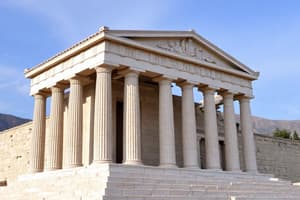Podcast
Questions and Answers
During which centuries did Classicism emerge?
During which centuries did Classicism emerge?
- 17th-19th centuries
- 16th-18th centuries (correct)
- 13th-15th centuries
- 12th-14th centuries
What were some key aspects of Neoclassicism?
What were some key aspects of Neoclassicism?
- Inspiration from ancient Greece and Rome
- Exploration of themes of love and passion
- Focus on reason, order, and simplicity (correct)
- Emphasis on emotion and individualism
What were some key characteristics of Romanticism?
What were some key characteristics of Romanticism?
- Emphasis on reason, order, and balance
- Inspiration from the art and literature of ancient Greece and Rome
- Exploration of themes of love and passion
- Focus on emotion and individualism (correct)
Which literary movement focused on reason, order, and balance?
Which literary movement focused on reason, order, and balance?
What characterized Realism literature in the 19th century?
What characterized Realism literature in the 19th century?
What distinguished Modernism from traditional literary forms?
What distinguished Modernism from traditional literary forms?
What was a key aspect of Postmodernism literature in the late 20th century?
What was a key aspect of Postmodernism literature in the late 20th century?
In which literary movement was there an emphasis on the uniqueness of individual experiences?
In which literary movement was there an emphasis on the uniqueness of individual experiences?
Which literary movement focused on reflecting everyday life and portraying reality without embellishments?
Which literary movement focused on reflecting everyday life and portraying reality without embellishments?
What characterized Modernist literature in terms of writing style and techniques?
What characterized Modernist literature in terms of writing style and techniques?
Flashcards are hidden until you start studying
Study Notes
Literature: A Journey Through Major Literary Movements
Literature is a vast and diverse field, encompassing a wide range of styles, genres, and themes. Throughout history, literature has evolved and transformed, giving rise to various literary movements that have shaped the way we think, feel, and understand the world. In this article, we will delve into the major literary movements that have marked the literary landscape, providing a brief overview of each movement and its impact on literature.
1. Classicism (16th-18th centuries)
Classicism emerged in the 16th century, drawing inspiration from the art and literature of ancient Greece and Rome. This movement emphasized the importance of reason, order, and balance in literature, as well as the use of elaborate language and sophisticated forms. Some key aspects of classicism include:
- Neoclassicism: A later phase of classicism that emerged in the 18th century, characterized by an emphasis on reason, order, and simplicity.
2. Romanticism (18th-19th centuries)
Romanticism emerged as a reaction to classicism and industrialization, focusing on emotion, individualism, and the beauty of nature. Key characteristics of romanticism include:
- Emphasis on emotion: Romantic writers placed great importance on the expression of personal emotions, often exploring themes of love, passion, and the sublime.
- Individualism: The movement emphasized the uniqueness of the individual and the importance of personal experiences and perceptions.
- Nature: Romantic literature often celebrated the beauty and power of nature, reflecting a growing interest in environmentalism and a desire to escape the confines of urban life.
3. Realism (19th-20th centuries)
Realism emerged in the 19th century as a response to romanticism, focusing on the portrayal of everyday life and the representation of reality in literature. Key aspects of realism include:
- Emphasis on the ordinary: Realist literature often portrayed the lives of ordinary people, focusing on their experiences and struggles.
- Objective representation: Realist writers sought to portray reality as it was, without the use of embellishments or romanticized elements.
- Critique of society: Realist literature often addressed social issues and critiqued the injustices and inequalities of society.
4. Modernism (20th century)
Modernism emerged in the early 20th century, characterized by a rejection of traditional literary forms and the exploration of new, experimental styles. Key aspects of modernism include:
- Experimentation: Modernist writers often experimented with new forms, styles, and techniques, breaking away from the conventions of traditional literature.
- Subjectivity: Modernist literature often reflected the subjective experiences and perceptions of the writer, challenging the notion of objective reality.
- Exploration of the avant-garde: Modernist writers often embraced the avant-garde, exploring the boundaries of art and literature.
5. Postmodernism (20th-21st centuries)
Postmodernism emerged in the late 20th century as a reaction to modernism, characterized by a rejection of grand narratives and the exploration of fragmentation and the pastiche. Key aspects of postmodernism include:
- Exploration of the fragmented: Postmodern literature often reflected the fragmented nature of modern life, exploring themes of disillusionment, alienation, and the loss of meaning.
- Pastiche: Postmodern writers often incorporated elements from various literary styles and genres, creating a pastiche of different literary traditions.
- Rejection of grand narratives: Postmodern literature often rejected the notion of grand narratives, instead focusing on the subjective experiences and perceptions of the individual.
Conclusion
Throughout history, literature has evolved and transformed, giving rise to various literary movements that have shaped the way we think, feel, and understand the world. From classicism and romanticism to realism and modernism, each movement has left a lasting impact on the literary landscape, inspiring new generations of writers and readers alike. As we continue to explore the world of literature, we can look forward to the emergence of new movements and the further development of this rich and diverse field.
Studying That Suits You
Use AI to generate personalized quizzes and flashcards to suit your learning preferences.




